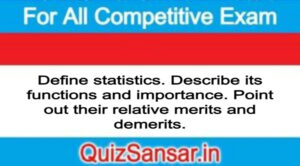
Define statistics. Describe its functions and importance. Point out their relative merits and demerits.
Define statistics. Describe its functions and importance. Point out their relative merits and demerits.
Or
Define the term ‘Statistics’ and discuss its importance in business.
Ans.
Definitions of statistical facts or statistical data
To the layman, the term statistics usually carries only the nebulous and too often, distasteful connotation of figures, and he usually understands statistics as the numbers which counts articles. This is a wrong notion. In fact, statistical data are such numbers which possess certain attributes which are the basis of statistical science.
Functions of Statistics
(1) To Simplify Complex data: The raw data collected are complex. and unwieldy. It is the prime function of statistics to simply the large number of unsystematic data and to make them understable.
(2) To Compare simplified data and establish relationship : Statistics facilitate comparison and interpretation by arraying numerical data according to different characteristics possessed by them. These simplified data are used for finding out averages, dispersion, correlation and their coefficients to make them comparable. For example, comparision of per capita income of two countries can be made with the help of averages and coefficients and uneven distribution of income can be ascertained.
(3) Formulation of Policies : Statistical methods help in formulating policies in social, economic and business fields. It also helps in the formulation of policies and drawing inferences in the field of planning, taxation, foreign trade and wine-prohibition etc. Statistics helps in the evaluation of results of present policies. For example, numerical analysis only can tell the extent of success of liberalisation and privatisation policies of the government.
(4) To enlarge individual experience and knowledge : Dr. Bowley has written, “the proper function, indeed, of statistics is to enlarge individual experience.” statistics enlarges individual experiences like other sciences. Many fields of knowledge would have remained closed to mankind but for scientific statistical techniques. Without proper use of statistical methods, the knowledge of mankind is incomplete and inadequate. Proper knowledge about the related subjects e.g. economics, business administration, sociology etc. for an investigator in the field of applied statistics is also essential. A statistician obtains various kinds of experiences from statistical investigations. For example, a study of socio economic position of workers working in an industry, the statistician shall require some preliminary knowledge about the workers. He will be required to take wise decisions at times.
(5) To analyse and indicate future trend or to make estimation : Various statistical methods not only analyse the present facts but also aids in future predictions. This fraction is performed by statistical techniques of extrapolation, regression and forecasting. Infact future plans of economic developments are based on future predictions. Statistical predictions are more real than the casual predictions. Dr. Bowley has rightly told, a statistical estimate may be good or bad, accurate or the reverse, but in almost all cases it is likely to be more accurate than a casual observer’s impression.”
(6) To test the laws of other sciences: Statistical methods are immensely useful in formulating and testing hypothesis and then to develop the new theories. Economics, sociology, biology, astrology etc. and many more are obliged to statistics for it. Only on the basis of statistical data, Malthus theory of population, quantity theory of money etc. could essentialy be revised. It is not an exaggeration to say that the development of science could be possible only with the use of statistical methods.
(7) To throw light on magnitude of problems: Conclusion can be drawn without the aid of statistics, but there is always a question mark regarding their reliability. For example, a simple statement that the population of India has increased very rapidly during 1981 and 1991, is not at all effective. But when it is stated that the population of India was 68.33 crores in 1981, whereas it increased to 84.63 crores in 1991, it becomes more effective and reliable. A famous statistician Kelvin has rightly observed, “when you can measure what you are speaking about and express it in numbers, you know something about it, but when you cannot measure and cannot express in numbers, your knowledge is of a meagre and unsatisfactory kind,”
Importance of Statistics
In ancient times statistics was regarded as political arithmetic because its utility was limited to the extent of state only. But in modern times its use has been extended to all scientific experiments where observations have to be recorded and compared to draw inferences. In the words of Wall and Roberts, “Statistics is a tool which can be used in attacking problems that arise in almost every field of empirical inquiry.” It will not be an exaggeration, if present day statistics is called an arithmetic of human welfare.
(1) Importance in Administration : As has already been indicated. In the ancient days statistics was the science of statecraft and objective of which was to collect data for manpower, crimes, income and wealth etc. for formulating suitable military and fiscal policies. But in modern times present state is not only a police state but has become a welfare state. To carry on welfare works of the state suitably, the importance of statistics has more enhanced. As such, data are called as the eyes of state management.
(2) Importance in Economic Planning: The modern age is termed as the “Age of Planning.” Almost all governments, business and management undertakings are resorting to planning for efficient working and formulating policies. Tippett has rightly said, “Planning is the order of the day and without statistics planning is inconceivable.”
Economic Planning of any country is possible only with the aid of available resources, main problems and necessary statistical material and without which planning is not possible. On the basis of availability of adequate and reliable data the planner of the country obtains correct information about the available natural resources and mankind resources, capital, national income statistics etc. Only on the basis of data, we can know the short period and long period necessities of the country so as to determine the priorities. On the basis of all these data, targets are determined in different spheres of economic management and to attain the sam, estimates are made for suitable data of financial resources. Thus, statistical data are the base of planning.
Not only this, even the evaluation of development of planning is possible with the help of statistical techniques. The data tell about the fact that in which spheres of phenomena, the targets have been attained or achieved and in which spheres the proposed targets could not be achieved. In short, “Planning without statistics is a ship without rudder and compass.” Just as a ship may lose its path and direction without rudder and compass, economic planning and its evaluation for attainment of targets are impossible without statistics and statistical tools. In fact, economic planning without the data is just like roaming in dark.
The government of India after independence has taken some steps to remove defects of Indian statistical data by establishing Central Statistical Organisation (CSO), National Sample Survey Organisation (NSSO), Permanent Population Census Organisation (PPCO), along with the establishment of Computer Centre, National Investigation Centre (NIC) and N.A.B.S. Apart from this, statistical organisations have been established in each state which collect, analyse and interpret the statistical material through out the year with the help of efficient statisticians and investigators. Establishment of Indian Statistical Institute, Indian Council of Agricultural Research and NCAER etc. is the vital step towards achieving the aforesaid objectives. Thus the government as well as the National sample survey are very much active as regards the usefulness and importance of statistics in India.
(3) Importance in Business and Commerce
Although statistical data and statistical methods are applied in every sphere of investigation, they are useful especially in business and commerce. In every field of trade, industry and commerce, the use of data in adequate quantity is essential to be successful. A trader has to estimate the demand of an article with the help of relevant data along with determining the purchase-sale and advertisement policies. While making estimates for demand of an article, one has to take into consideration necessary data regarding seasonal variations, cyclical fluctuations, taste, customs, living standards of customers alongwith their purchasing power, otherwise the estimates may be wrong. Thus, there is hardly a branch in business and commerce that consciously or unconsciously, is not based on estimate and forecast. Business today is a gamble of estimates. In the words of Boddington, “the successful businessman is the one whose estimates most closely approaches accuracy.”
Statistical data are quite useful in business management and administration. According to Ya-Lun-Chou, “it is not an exaggaration to say that today nearly every decision in business is made with the aid of statistical data and statistical methods.” Every business manager has to take suitable decisions regarding market research, appointment of workers, and their training, investment policy, quality control and many other directions. Statistical methods prove to be useful for such decisions in two ways: firstly by producing numerical data before them, and secondly by making assessment of probability of risks attached to wrong decisions. As such, for taking wise decisions avoiding uncertainties largely depend upon collection, analysis and interpretation of relevent statistical data and statistical methods.
Statistical techniques also helps in controlling quality of the products by preparing control. Charts and fixing of central line (standard) as well as upper and lower control limits. Thus statistical methods are useful in (1) planning for activities. (2) determination of standards, and (3) control.
(4) Importance in Economics: According to Ya-Lun-Chou, “Economics depend upon to measure economic aggregates, such as Gross National Product, Consumption, Savings, Investments, Expenditures and changes in the Value of Money. They also use statistical methods to verify Economic Theory and to test Hypothesis.”
Thus, statistical data and statistical techniques have proved very useful is solution of various economic problems such as production, consumption, distribution of income and wealth, wages and price determination, profits, savings, expenditure, unemployment, poverty etc. Statistical techniques have also been used in measuring gross products and input-output analysis. Statistical techniques are also used in the analysis of cost functions, production functions and consumption functions. Use of statistics has also led to the formulation of many economic laws like Engle’s law of consumption, Law of distribution of income, Preferential analysis of Prof. Samuelson etc. Thus statistical methods are very useful and vital in Micro economics as well as in Macro Economics.
(5) Universal Utility of Statistics : Thus statistics has wide utility. The use of statistics has been regularly and continuously increasing in every field of knowledge and science. Its use is vital in Sociology, Education, Psychology, Physics and Chemistry, Biology, Astrology, and Medical Sciences. It is an important tool for research in every field of learning. Statistics is also used in the sphere of literature where authors way of writing is studied by means of measuring frequencies of different words, length of sentences etc. According to Edvard J Kane,” Statistical methods are used today in almost every branch of learning and enquiry from the graphic arts to astrophysics and in nearly every sort of application from musical composition to missile guidance. Tipett has rightly said, Statistics affects everybody and touches life at many points.” The knowledge of statistics has proved to be very useful in present days. In the words of Dr. Bowley,” A knowledge of statistics is like a knowledge of foreign language of algebra, it may prove of use at any time, under any circumstances.”






